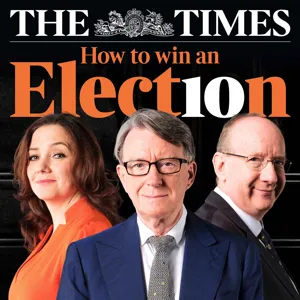Podcast Summary
Mint Mobile reduces unlimited plan price to $15 per month: Mint Mobile lowers unlimited plan price to $15 per month, offering a more affordable option in the market and potentially attracting new customers
Despite the ability of large wireless companies to raise prices due to inflation, Mint Mobile is reducing its unlimited plan price from $30 to $15 per month for new customers. This move comes as a response to the ongoing debate about the power of corporations to hike prices, which was discussed in a recent podcast episode of "How to Win an Election." The podcast, hosted by Peter Mandelson, Daniel Finkelstein, and Polly Mackenzie, delved into the topic of policy and the trio's experiences in politics. During the discussion, they touched upon the idea of competition and the importance of offering better deals to consumers. Mint Mobile's price reduction can be seen as an example of this concept in action. The company's commitment to providing affordable mobile plans is a significant differentiator in the market, where larger competitors may not feel the same pressure to keep prices low. This move could potentially attract new customers and strengthen Mint Mobile's position in the industry.
British Monarch's Queen's Speech Outlines Government's Legislative Plans: The Queen's Speech, an annual political event, provides the government an opportunity to outline their legislative plans, create challenges for the opposition, and dominate the news agenda during election season.
The Queen's Speech, delivered by the British monarch at the start of each parliamentary year, is a significant political event, especially in the run-up to a general election. The government uses this speech to outline their legislative plans and create challenges for the opposition party, aiming to dominate the news agenda, create internal conflicts, and distract attention from the election. The speech often contains a mix of popular but insignificant measures and larger, more controversial proposals, which are negotiated among various departments and allocated time for passage. The ultimate goal is to create tension, conflict, and potential embarrassment for the opposition, which may go unnoticed by the public.
Focusing on practical implications of policies: Government policies may not significantly impact public during party conferences, but their practical implications can have lasting effects.
Despite the government's efforts to make headlines with various policies during the party conference, the public may not be significantly impacted by these disputes in Westminster. Instead, it's essential to focus on the practical implications of the legislation being proposed. For instance, a football regulator may not matter much once it's appointed, as the government might no longer be in power by then. Moreover, some policies, like clamping down on homeless people living in tents, might not even make it into the King's speech but could still significantly impact people's lives. Ultimately, the success of a minister's political career depends on their ability to balance their party's interests with their personal agendas and the public's needs.
British Politician Pushing Boundaries for Leadership: Politicians seeking leadership roles may disrupt the status quo, but their success depends on addressing people's concerns effectively and improving lives.
Suella Braverman, a British politician, is pushing the boundaries of her position without getting fired, aiming to be the right-wing candidate for the next leadership election. Her actions may seem disruptive or even controversial, but what truly shifts politics is how policies impact people's lives. The disconnect between legislative programs and political debates can lead to misunderstandings, as was the case during the Brexit debate. Braverman's tactics, which include grandstanding on issues involving vulnerable people and minorities, are aimed at disrupting the established order and upending the status quo. Prime Minister Rishi Sunak, who is currently in power, faced a similar situation with an attention-seeking politician in his cabinet. My advice to Sunak, or any prime minister in a similar situation, would be to address the issue earlier rather than later. Allowing disruptive behavior to continue can lead to larger problems down the line. Ultimately, the success of a politician depends on their ability to improve people's lives and address their concerns effectively.
Identify root issues and engage with experts and public: Effective election policies require addressing root issues, engaging experts and public for input.
Creating effective policies for an election begins by identifying the problems you want to solve for the country and understanding what the public desires. Polly, with her experience as an adviser and policy official, emphasizes the importance of starting with the root issue and engaging with relevant experts and the public. However, she acknowledges that the policy-making process can be messy and complex in reality. Ultimately, the leader of a political party is responsible for offering policies to the public, making it a crucial starting point in the policy development process.
Effective Leadership and Policy Making in Government: Strong leadership and a well-structured policy-making process are crucial for creating effective policies and moving the country forward.
Effective leadership is crucial for setting the direction and creating policies for a government. The prime minister or party leader plays a pivotal role in shaping the agenda and making big decisions on major issues like tax, spending, and defense. However, not all policies are formed in government, and oppositions create many policies during their tenure, which can take years to implement. The quality of the policy-making process is also essential, requiring clear thinking, decisiveness, and proper follow-up. A chaotic policy-making environment with mixed messages and lack of effective leadership can result in poor-quality policies. In summary, strong leadership and a well-structured policy-making process are essential for creating effective policies and moving the country forward.
Policies need to be feasible and implementable: Clear, concise messages are important for elections, but policies also need to be feasible, easily understood, and capable of implementation with underlying factors in mind for long-term success.
While having a clear, concise message is important for winning elections, it's equally important to have a detailed plan for implementing policies once in office. Policies need to be easily understood and communicated to the media and the public, but they also need to be feasible and capable of implementation. The success of a policy often depends on underlying factors that may not be immediately apparent, such as reforms to complex systems or the availability of skilled labor. A good example of this is the Conservative Party's teaching of reading through phonics, which was a successful policy that didn't receive much attention during the election but had a significant impact once in office. Ultimately, the quality of a policy lies not just in its appeal on the doorstep, but in its ability to perform at multiple levels and deliver results in the long term.
Examples of well-intentioned policies leading to failures: Policymakers must carefully consider the economic implications and feasibility of their proposals to avoid costly mistakes
Well-intentioned policies can still lead to embarrassing failures when not properly thought through. Two examples were shared during the discussion: the tax guarantee and the pensions triple lock. The tax guarantee, which was intended to boost public trust, ultimately proved untenable due to its unrealistic promise. The pensions triple lock, on the other hand, was a result of political one-upmanship and has led to significant financial implications. These examples illustrate the importance of careful consideration and economic reality when crafting policies.
David Cameron's green agenda led to high-speed rail investment in the UK: Cameron's green agenda initiated high-speed rail investment, prompting Labour's airport expansion response, and eventually leading to a contentious election issue
The decision to invest in high-speed rail in the UK can be traced back to David Cameron's tenure as Prime Minister. He promised a high-speed rail project as part of his green agenda, which led the Labour Party to expand airport projects in response. When Cameron and Osborne returned from Japan with plans for high-speed rail, the Conservatives felt compelled to follow suit. However, the impact of tuition fees on university attendance and affordability came after 2015 when maintenance grants were abolished. A record titled "How to Win an Election" by Peter Sellers, Spike Milligan, and Harry Secombe was mentioned in the conversation, and a listener, Jay Doherty, accused Chorley of plagiarism. The 1964 record was presented as a gift to settle the matter. Door-to-door campaigning was also discussed as an essential tactic in elections, providing valuable insights into voters' attitudes and preferences.
Understanding Electorate through Canvassing and GOTV: Canvassing and GOTV campaigns can impact election outcomes, especially in close races. However, voters' opinions may not always align with their actions. A mix of both canvassing and polling data can give a more accurate picture.
While polling and focus groups are valuable tools in understanding the electorate, high-quality canvassing and get out the vote campaigns can make a significant difference at the margin in individual constituencies. This is especially important in seats where the outcome is decided by a small number of votes. However, it's important to note that how voters think and talk about issues may not always align with their actions in the polling booth. While scientific research exists on this subject, politicians should not solely rely on doorstep conversations and ignore polling data. Instead, a combination of both methods can provide a more comprehensive understanding of the electorate and help in crafting effective campaign strategies.


